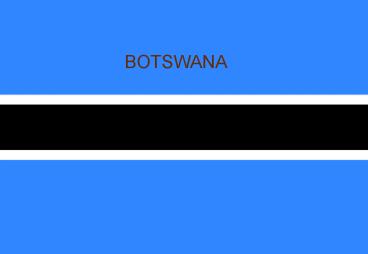BOTSWANA PowerPoint PPT Presentation
1 / 17
Title: BOTSWANA
1
BOTSWANA
2
Agenda
- Introduction
- History / Institutions
- Natural Resources
- Future Challenges
- QA
3
From 1966 to Today
GDP per capita over time (Nominal PPP)
4
Similar to other Sub-Sahran countries
- Tiny African country (less than 2 million
population) - British colonial rule
- Minerals Diamonds
- Aid
5
GDP decomposition by sectors
Adapted from Tregenna, Fiona, Explaining
Botswanas Growth With a Comparison to Chile
6
Presentation plan
- History / Institutions
- Why didnt other countries develop them?
- How did they survive the colonial rule?
- Use of mineral resources
- Why diamonds were not a curse?
- Current problems and challenges ahead
- High economic dependency on diamond mining
- HIV
7
Introduction - Botswanas history
- The Batswana, a term used to denote the
citizens of Botswana, also refers to the
country's major ethnic group (the "Tswana" in
South Africa), which came into the area from
South Africa during the Zulu wars of the early
1880s. - Prior to independence, decades of unrest.
Hostilities grow between various factions , the
Tswana inhabitants and the Boer settlers from the
Transvaal. - March 31, 1885 Asked for assistance, the United
Kingdom puts "Bechuanaland" under its protection. - North of Bechuanaland becomes Botswana, south of
the country in integrated to South Africa. - 30 September 1966 Botswana gain independence
from the United Kingdom. - Independence leader Seretse Khama becomes
Botswanas first president. Ruling party is the
Botswana Democratic Party ( BDP).
8
The Botswana Miracle Importance of institutions
- Since 1969 Botswana begins to play a more
significant role in international politics,
putting itself forward as a non-racial, liberal
democratic alternative to South African
apartheid. One of its main contributions is the
SADCC ( Southern African Development
Coordination Conference), that aims to promote
economic development, encourage conflict
resolution and good governance in the area. - Economic Boom Since its independence, Botswana
has transformed itself from one of the poorest
countries in the world to a middle income
country, with an annual economic growth of 9 a
year and one of the fastest growth rates in per
capita income in the world. It has grown
considerably thanks to the mining of Diamond and
other minerals, sale of beef to Europe and the
World market and extensive development of
educational and health facilities. - Botswana's impressive economic record has been
enabled by the governments prudent fiscal
policies, by international financial and
technical assistance and by a cautious foreign
policy. Botswana has been rated as the least
corrupt country in Africa, according to an
international corruption watchdog. - The Good underlying political and economic
institutions were a result of Pre-colonial
political institutions, all facilitated by - Limited British colonialism
- Strong political leadership since Independence
- Elites motivation to reinforce institutions
9
"...we intend to conserve our resources wisely
and not destroy them. Those of us who happen to
live in Botswana in the 20th century are no more
important than our descendants in centuries to
come. - Hon. Sir QKI Masire,former President
of Botswana
Managing the Resource Curse
10
Pitfalls of Natural Resource Wealth
- Discord and conflict among domestic stakeholders
- politicians, developers, local tribes, and
citizens - Resource rents tend to induce corruption
- Reduced accountability pressure
- In developing countries large resource rents may
have the same negative impact as massive foreign
aid inflows. - Reduced taxes and reduced fiscal discipline.
Therefore, resource management could produce
economic prosperity
11
Managing the Resource Curse
- A long term natural resource extraction plan
- An effective mechanism for spending revenues on
the social and economic infrastructure for
sustained growth - Resource rent is invested to develop
infrastructure - electricity and water distribution networks,
primary schools and hospitals - Creating an industry around diamonds
12
Governance Research Indicator Country Snapshot
(GRICS), 2002
- Voice and Accountability is measured by political
process, civil liberties and political right and
indicates the ability to discipline those in
authority for revenue extraction - Government effectiveness is measured by the
quality of public services and the competence of
civil servants - Anti corruption policies are essential for fair
and transparent distribution of resource benefits
13
Growth Contribution by Mining, 1980/812003/04
(Percent change)
14
The Road Ahead
- Key Challenges
- Need for Economic Diversification
- Diamond contribution to the GDP (33) set to slow
- World Prices, New Mines
- HIV infection
- 40 of adult population infected
- Life expectancy 61yrs (1995) to 35yrs (2006)
- Social / Economic Costs
- Actively fighting the disease, with success
- Growing authoritarian politics
- Indigenous tribes discrimination San
Global Insight
15
Summary
- Botswanas Success
- Good Institutions Good Leaders
- Diamonds Proper Resource Management
- Luck?
16
Thank you for your attentionQA
17
The odds against success
- Botswana is a predominantly tropical, landlocked
country - When the British left, there were 12 kilometers
of paved road, 22 Batswana who had graduated from
University and 100 from secondary school - Abundant natural resource with the potential to
impede economic growth
So how did Botswana do it?

